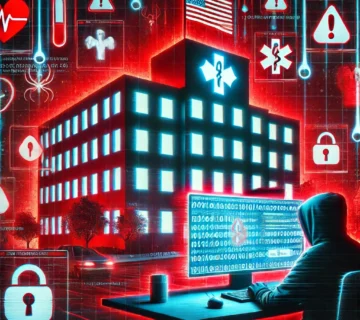The Cost of Data Breaches in Healthcare: An In-Depth Analysis
Cyberattacks are growing in sophistication and frequency, and the cost of data breaches continues to rise, especially in the healthcare industry. A recent study by IBM and the Ponemon Institute, the 2024 Cost of Data Breach Study, highlights the severe financial impacts of data breaches across various sectors. This article explores the unique challenges faced by the healthcare industry, the escalating costs of breaches, and potential strategies for mitigating these risks.
The Cost of Data Breaches in Healthcare The healthcare industry faces the highest average costs for data breaches. According to the 2024 Cost of Data Breach Study, the average cost of a healthcare data breach reached $10.93 million, far surpassing the global average of $4.45 million. This significant cost difference highlights the critical need for robust cybersecurity measures in healthcare.
Unique Challenges in Healthcare Cybersecurity Healthcare organizations manage vast amounts of sensitive patient information, making them prime targets for cyberattacks. The complexity of healthcare systems and the need for seamless data access across multiple environments further complicate security efforts.
Financial Impact of Healthcare Data Breaches Data breaches in healthcare not only incur immediate financial losses but also result in long-term reputational damage and loss of patient trust. These breaches often lead to substantial fines and legal fees, further escalating the overall cost.
Historical Trends in Data Breach Costs Over the past decade, the cost of data breaches in healthcare has consistently increased. In 2014, the average cost of a breach was $3.5 million, compared to $10.93 million in 2023. This upward trend underscores the growing financial burden on healthcare providers.
Regulations Affecting Healthcare Data Several regulations govern data handling in healthcare, including the Health Insurance Portability and Accountability Act (HIPAA), the Health Information Technology for Economic and Clinical Health Act (HITECH), and the General Data Protection Regulation (GDPR). Compliance with these regulations adds to the industry’s high data breach costs.
Duration and Detection of Breaches On average, healthcare data breaches take 213 days to detect, compared to 194 days for other industries. This prolonged detection time exacerbates the impact and cost of breaches.
Breach Detection Methods Only one-third of healthcare breaches are detected by internal security staff. The remaining breaches are often discovered by external parties or through post-breach investigations, leading to delayed responses and increased costs.
Rising Trends: Large Scale Breaches Recent years have seen a rise in very large breaches involving millions of records. These breaches result in higher costs and longer recovery times, emphasizing the need for comprehensive security measures.
Factors Contributing to Higher Costs Several factors contribute to the higher costs of data breaches in healthcare, including the sensitive nature of patient data, regulatory fines, and the need for extensive post-breach remediation efforts.
The Role of Stolen Credentials Breaches involving stolen credentials take the longest to resolve, averaging 292 days. The misuse of stolen credentials allows attackers prolonged access to sensitive systems, increasing the damage and cost.
Impact on Healthcare Providers Healthcare providers suffer significantly from data breaches, facing financial losses, operational disruptions, and damage to patient trust. The high costs of remediation and legal actions further strain healthcare resources.
The Power of AI and Automation in Cybersecurity Organizations leveraging AI and automation in their cybersecurity efforts experience significant cost reductions. The 2024 Cost of Data Breach Study found that AI and automation reduced breach costs by an average of $1.76 million and shortened the breach lifecycle by 108 days.
Cost Reduction Through AI Implementing AI-driven security measures helps in early detection and rapid response to breaches, mitigating the financial impact and reducing recovery times.
Strategies for Strengthening Cybersecurity in Healthcare Healthcare organizations can adopt several strategies to enhance their cybersecurity posture and reduce the risk of data breaches.
Incident Response Planning Developing and regularly testing an incident response plan is crucial for minimizing the impact of data breaches. Preparedness enables organizations to respond swiftly and effectively to security incidents.
Employee Training Continuous training and awareness programs for employees help in recognizing and mitigating potential security threats. Educated staff are better equipped to handle phishing attacks and other cyber threats.
Risk Mitigation Techniques Effective risk mitigation involves implementing robust security measures such as data encryption, identity and access management, and secure data storage practices.
Data Encryption Encrypting sensitive patient data both in transit and at rest adds a vital layer of security, making it difficult for attackers to access and exploit information.
Identity and Access Management Implementing stringent identity and access management protocols ensures that only authorized personnel can access sensitive data, reducing the risk of breaches.
Embracing DevSecOps Integrating security into the development process through DevSecOps practices ensures that applications are built with security in mind from the outset, reducing vulnerabilities.
Multi-Environment Data Storage Healthcare organizations often store data across multiple environments, including public clouds, private clouds, and on-site servers. While this approach meets diverse storage needs, it complicates security efforts.
Investing in Managed Security Services Managed security services can provide healthcare organizations with expert support and advanced security solutions, enhancing their overall cybersecurity posture.
How Technijian Can Help
Technijian specializes in delivering tailored cybersecurity solutions to the healthcare industry, addressing its unique challenges and requirements. Here’s how Technijian can help:
- Comprehensive Security Assessments: Technijian conducts thorough security assessments to identify vulnerabilities in your systems and processes. This includes evaluating your network infrastructure, data storage solutions, and access management protocols.
- Advanced Threat Detection: Utilizing the latest in AI and automation, Technijian offers advanced threat detection services. These technologies help in identifying and mitigating threats in real-time, significantly reducing the risk of breaches.
- Incident Response Planning and Management: Technijian helps healthcare organizations develop and implement robust incident response plans. These plans ensure that your team is prepared to respond quickly and effectively to any security incident, minimizing the impact and cost.
- Employee Training Programs: Technijian provides comprehensive training programs to educate your staff on the latest cybersecurity threats and best practices. Regular training ensures that employees can recognize and respond to potential threats, enhancing overall security.
- Data Encryption and Protection: Technijian offers state-of-the-art encryption solutions to protect sensitive patient data both in transit and at rest. This added layer of security makes it significantly more challenging for attackers to access and exploit your data.
- Identity and Access Management: Technijian implements stringent identity and access management protocols to ensure that only authorized personnel have access to sensitive information. This reduces the risk of insider threats and unauthorized access.
- Secure Data Storage Solutions: Technijian assists in setting up secure data storage solutions across multiple environments, including public clouds, private clouds, and on-site servers. This ensures that your data is protected no matter where it is stored.
- DevSecOps Integration: Technijian helps integrate security into your development processes through DevSecOps practices. This approach ensures that security is considered at every stage of application development, reducing vulnerabilities from the outset.
- Managed Security Services: By offering managed security services, Technijian provides continuous monitoring and management of your security infrastructure. This includes regular updates, threat monitoring, and immediate response to any detected threats.
- Compliance Support: Technijian assists healthcare organizations in meeting regulatory requirements such as HIPAA, HITECH, and GDPR. This includes ensuring that your data handling practices comply with all relevant regulations, reducing the risk of fines and legal action.
By partnering with Technijian, healthcare organizations can significantly enhance their cybersecurity posture, reduce the risk of data breaches, and protect sensitive patient information. With a comprehensive range of services tailored to the unique needs of the healthcare industry, Technijian ensures that your organization is well-equipped to handle the ever-evolving threat landscape.
Conclusion
The healthcare industry faces uniquely high costs and challenges when it comes to data breaches. By adopting comprehensive security strategies, leveraging AI and automation, and investing in managed security services, healthcare providers can significantly reduce the financial impact of breaches and protect sensitive patient data.
FAQs
- What are the average costs of data breaches in the healthcare industry? The average cost of a data breach in the healthcare industry is $10.93 million, according to the 2024 Cost of Data Breach Study.
- Why are data breaches more expensive in healthcare than in other industries? Healthcare data breaches are costlier due to the sensitive nature of patient information, regulatory fines, and extensive remediation efforts required.
- How long do healthcare data breaches typically go undetected? On average, healthcare data breaches take 213 days to detect.
- What role does AI play in reducing the cost of data breaches? AI helps in early detection and rapid response to breaches, reducing the financial impact and shortening recovery times.
- What are some effective strategies for mitigating data breach risks in healthcare? Effective strategies include incident response planning, employee training, data encryption, identity and access management, and adopting DevSecOps practices.
- How can managed security services benefit healthcare organizations? Managed security services provide expert support and advanced security solutions, enhancing the cybersecurity posture of healthcare organizations.
About Technijian
Technijian is a leading Managed Service Provider (MSP) offering comprehensive IT Solutions tailored to meet the diverse needs of businesses. Specializing in IT Security and Network Security, Technijian ensures your organization’s data is protected against cyber threats. Our robust IT Services include 24/7 IT Support, ensuring seamless operation and minimal downtime for your business.
As experts in Cloud Computing Services, Technijian enables businesses to harness the power of the cloud for enhanced flexibility, scalability, and efficiency. Our IT Management solutions streamline operations, allowing you to focus on core business activities while we handle the complexities of your IT infrastructure.
Our team of skilled IT Consultants provides strategic guidance and customized IT Solutions, aligning technology with your business goals. Technijian’s comprehensive range of IT Services ensures optimal performance and reliability, making us your trusted partner in Information Technology.
With a commitment to excellence, Technijian delivers proactive Managed IT Services, anticipating and addressing potential issues before they impact your business. Our dedication to providing top-notch IT Support around the clock guarantees that your IT environment remains secure, efficient, and aligned with industry best practices. Choose Technijian for unparalleled IT Solutions that drive your business forward.



